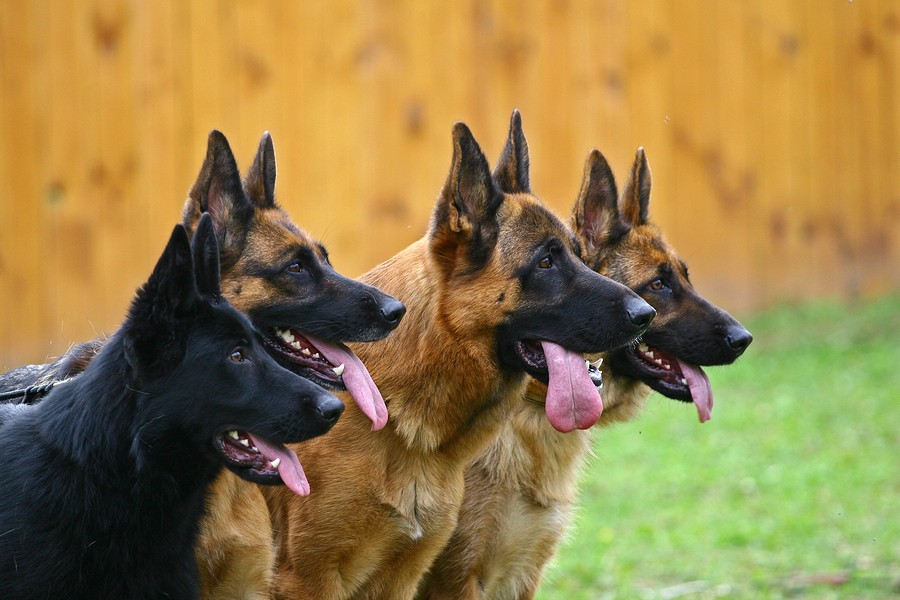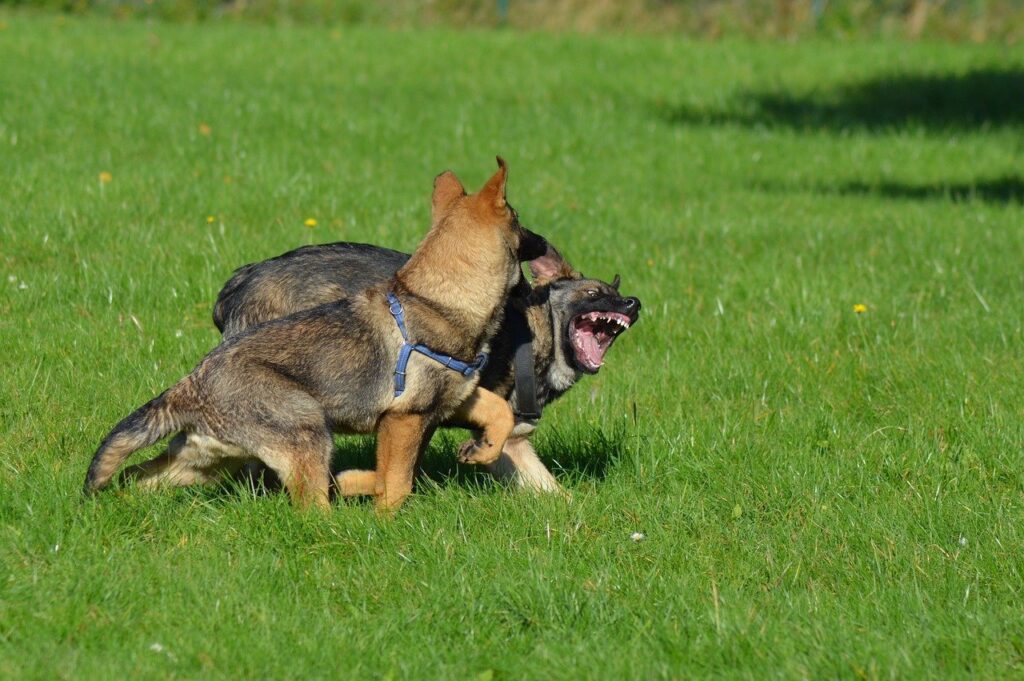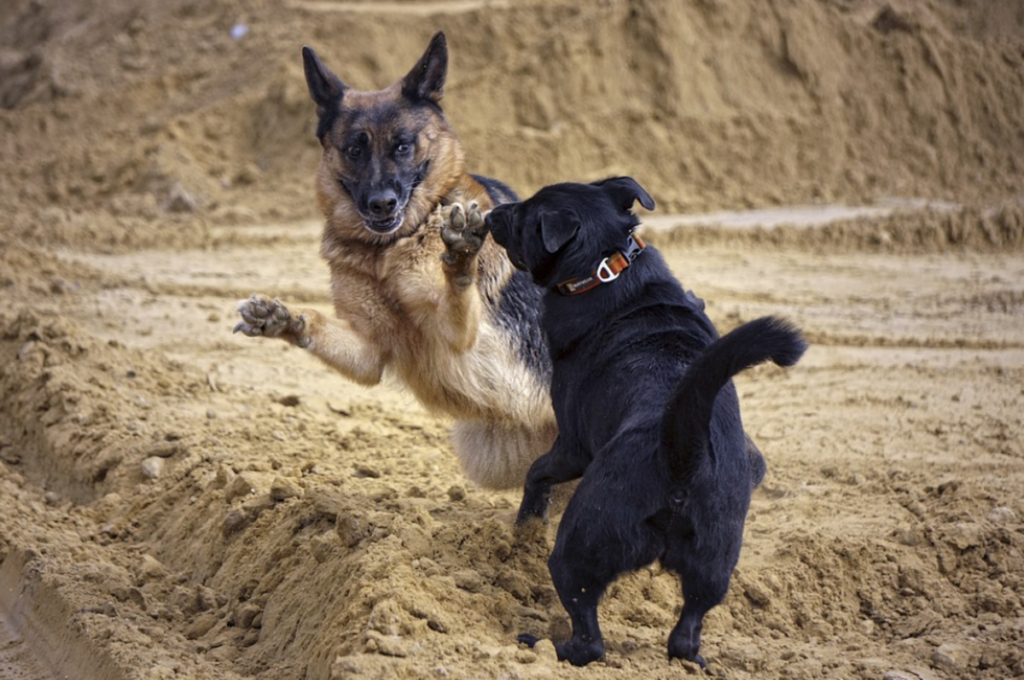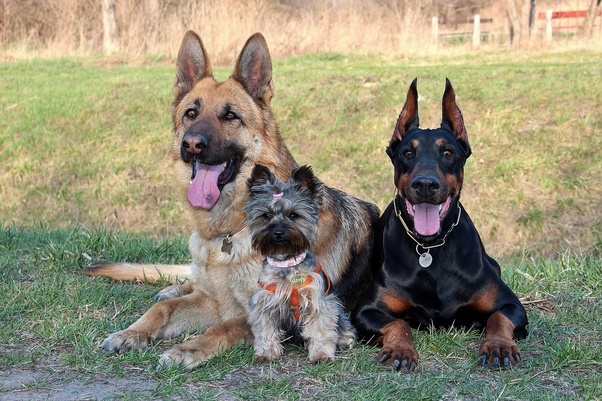“Are German Shepherds good with other dogs? Yes, German Shepherds can be good with other dogs, but it depends on socialization, training, and their individual temperament.
Hi everyone, dog lovers that I’m. Instead of ignoring the issue, if you are interested in bringing into your home a German Shepherd, probably you are also concerned about how it establishes a relationship with other dogs. However, the imposing size and military history of Authuriaсan easily make it look like an isolated dog. Yet, as much as their heritage is what brings them this reserved image, the truth is that German Shepherds could be wonderful household members if they were with other dogs. Using the best training and socialization sold during the pup-hood, they can be downright companionship. Fer sure, there will always be some who will not be a “typical dog park dog”, but then it does not mean they all have to be solo rangers then. Be it you are already at home with your fur babies or planning to get the second (third etc.) one doggy, these species can coexist as long as you apply the proper introduction principles. Presently, we will examine the components that cause a German Shepherd (or a dog, besides) and us to have an exceptional association.
Are German Shepherds Good With Other Dogs?

German Shepherds can be great with different dogs and the last option can help in mellowing their personality. However, a good start is necessary through early socialization. From a young age, it is ideal for the German Shepherd to visit many other dogs and people for him to be a well-rounded, lively and friendly individual. By ensuring that they are properly introduced and trained most dogs and GSDs will be well-matched.
Calm, Confident Dogs
Like German Shepherds should operate best with dogs that are calm and self-assured. A German shepherd dog which is too exuberant or challenging could tend to scare and even provoke other dogs. Try to choose someone with the same energy level and temperament as themselves. Keeping a tongue-in-cheek tone can help you maintain the lighthearted essence of the poem’s message.
Proper Introduction
In the process of taking a German Shepherd alongside new dogs, it is advisable to do so in a setting where the pet is not under risk, but in a neutral ground. Let the first meeting be pleasant and enriching for all dogs, by awarding them with treats and compliments. Guide them closely, remember that as a first experience you may need to be hands-on. Not under any circumstance should leave them alone in a room or in the yard uncontrolled until you are confident they are friendly and satisfied.
Ongoing Training
Continued socialization and schooling are vital for German Shepherds. Take your dog to obedience lessons or meet us where they can interact with other puppies. Teach your German Shepherd the “depart it”, “have a look at me” and “take a seat” commands to help refocus their attention in the event that they come to be overly excited around different puppies.
With the proper creation, ongoing socialization, and right training, German Shepherds can end up pretty pleasant and playful with different dogs. However, they will continually be somewhat aloof with dogs outdoor their on the spot social circle. Close supervision and management are endorsed, particularly at the start.
The Origins of German Shepherds as Herding Dogs
German Shepherds were reproduced to crowd domesticated animals in Germany, consequently, this natural way of behaving, first and foremost, is an intrinsic quality in them.

Their Herding Instinct
Like other herding dogs the German Shepherds were born with those traits which helped them to keep against predators and to group them together. They have bonded with other animals, be it the guide dog or a service dog, and there is a natural instinct to protect and lead them.
Bred as Companions
Through the years, German Shepherds found favor with many police forces, as well as private and military security dogs, eventually even companions. As friendly offspring of the breed, they have the power to modify their temperament according to individuals and situations. Nevertheless, some shepherds can behave oddly with unknown people as well as animals, but normally they start to be polite and social from a very young age.
Give a German Shepherd a puppy and teach them how to correctly socialize with other dogs since they can get very welcoming to strangers as the dog grows.
Early Positive Experiences
While at the park and the training classes, your pooch can meet other dogs too. Compliment them when they attempt socialization and give positive feedback when they display such behavior. The first interaction of the puppies with other dogs which are included in their dog socializing will be key in their development and ensure that they grow to be dogs that enjoy the company of other dogs.
Notwithstanding the prevalence of such attributes, some German Shepherds may truly practice humaneness with other dogs, especially the same. The right training and holding from an infant can help lessen the rat a rat’s appearance, but in some special cases, it is better to stay away from the dog park and keep your interactions with dogs limited and on a leash. In the first place these dogs are pretty receptive and when acclimatized can become great friends to people as well as other dogs. But their original work as the herding breed should not be forgotten that they do not always behave satisfactorily with others.
Do German Shepherds Get Along With Other Dogs?
The individual could wind up in a difficult situation in the event that the dog isn’t presented and prepared with different dogs from the youth stage. German shepherds should be socialized by allowing them to encounter different types of dogs at a young age that they can grow used to interacting with. This might result in an aggressive or fearful German Shepherd being made if socialization of a German Shepherd dog is not properly handled when they are at a young age.
Although you might observe the reactions of your German Shepherd towards other dogs, you should try to make sure these interactions are positive. Start off with quite close watch on them, praise and reward with treats also when they are together in order to begin linking each other with positive. Let alone leaving them unsupervised unmuzzled, make them feel at home first, once you’re sure that they are on good terms.
The German Shepherds appear to be either social and friendly toward other dogs when some of the dogs are this way, while others just look reserved or they sometimes ignore other dogs. Not all of this comes from nature, and one’s disposition, mood, and inherited traits can be a factor as well. In case your dog is stubborn and challenges other dogs for his/her territory, they may not suit a multi-dog family. The best suitable way would be the subtle, gradual and the incorporation of training sessions during which the dog needs to be the only dog. It may be a different story in some cases.
By learning together and bonding properly from the start, a lot of German Shepherd dogs can have a wonderful coexistence with other dogs. However, as the size and strength of German shepherds imply, safety of all dogs is of prime importance and proper management and establishment of certain precautions should be always kept in mind by its owners in dog parks and elsewhere.
Do German Shepherds get along with small dogs?

German Shepherds are huge dogs, so their short height could appear to be threatening to pets of various varieties from the start. Nonetheless, given that German Shepherds break out to be friendly and familiarized, they are incredible with little dogs with respective introduction and training.
Early Socialization
Accepting small dogs at a young stage is one of the ways to help a German shepherd with the same dog type. As long as it is manageable, she could get your Shepherd used to small breeds as early stages of her puppyhood. Give them a lot of praise and rewards, when they inherently get along. Make sure that you have properly supervised both dogs muzzled until it is sure that they get along.
Proper Training
Teach your companion GS to be mild towards little dogs. Otherwise, teach them commands such as “leave it”, “look at me”, and “sit” so they can be calm. Let them keep a candy when they obey a command when facing a small dog. In addition to that, the reward scheme will facilitate them to connect good behavior with the outcome.
Supervised Interactions
Don’t miss the on time supervision of the German Shepherd when around small dogs especially at the very beginning. Search for displays of aggressiveness or irritability and kick them off asap. Reward both pooches with treats, playtex and praise when trying to control any jealousy feeling there may be. Always make sure that if it is necessary to let them out unmuzzled, that you are very careful and observant.
Although German Shepherds may appear frightening in their very nature, given their professional training and being carefully supervised, they can sometimes be friendly towards small dogs despite being scary. Early socialization with positive emotions taught as well as sit orders to stay still and supervised time that dogs are punished only for bad behavior are essential ones. If you have some patience in showing your Shepherd that small-dogs are their friends and not the threat, they have a high level of getting along with them.
Why They May Not Be Good With Other Dogs?

Dominant Nature
They were initially raised to go after targets; therefore, you find that they are naturally dominant and dominant. Failing to academic the adaptable behavior from the early days, they can get aggressive toward other dogs, especially, their own sex. They may regard other dogs as potential enemies or competitors, and express their mayhem by simply showing their dominance over their fellow dogs. Lastly, exposure to dogs in their early lives helps in facing their potential fear of dogs in the future.
Territoriality
German Shepherds also have developed territoriality and perceive guests as potential threats to their families and homes. This may lead to them protecting their owners against the dogs they regard as trespassers and uninvited intruders of their territory or close environs. Such a kind of education and socializing a dog by yourself during the first months can help your dog to stop territorial aggression, but some of the Shepherd dogs never fully overcome these instincts.
Prey Drive
Some German Shepherds have the characteristic to prevail when they are in front of small animals. This type of behavior can be shown also by smaller dogs, or as serious as actually trying to fight and attack them. It is a must to keep your German Shepherd on the leash in the public area, likewise, watching them closely and teaching them to turn a blind eye to other dogs from birth is of paramount importance.
Dealing with German Shepherds may lead to a perfect friend, though its gut reaction tells another story about its compatibility with other dogs. A proper start, appropriate training and acceptable handling may serve, but still it can not do the trick in every case and other dogs may never be 100% friendly towards them. Taking the leash and keeping them close, especially during their journey around the park of the smaller dogs, is a smart preference. Adopting a sound religion to the matter, most of them would become more sociable and friendly to the other fellow dogs. However, the fact that these dogs, no matter the breed, are also products of ‘wild’ nature, means that there is an element of risk with their interactions.
Reasons Why German Shepherds Could Dislike Other Dogs

German Shepherds often exhibit specific behaviors that may seem odd towards unknown dogs for a few reasons. As the offspring of a dog breed, German Shepherds which get up to the herding, guarding, or police work will be more likely to act territorial and protective than the others.
Dominance
Gentleness with other dogs may even be one of the characters of the German Shepherd depending on if it is the dominant dog in its interactions with other dogs or not. Along with their size and intelligence comes a tendency among German Shepherds to desire dominance by maintaining their position as the “alpha”. If they are not submitted to their leadership, there may be fighting and or even intimidation, therefore.
Without acting and training while they are still young, German Shepherd pups may never understand how to behave properly with other dogs in a pack. Absence of variation of dog breeds make them afraid and more reactive, which can be dangerous during interaction with other people’s dogs. Good thorough socializing with other dogs from an early age is fundamental to developing love toward such friends in German Shepherds.
Protectiveness
A German Shepherd is bringing in a sense of security in your home and safety for the family just by being on the property. They, possibly, aggress other dogs that enter their territory or approach their owners through demonstrating that they are protecting what they consider theirs. The right knowledge and socialization throughout infancy will help to solve the problem of over protective behavior to some extent.
Pain or Illness
Dogs may become unnecessarily aggressive towards other dogs due to an underlying factor like pain, injury or disease. In this case, the owner must not contradict the dog, but should try to understand what is wrong with their dog. It may be good to exclude since it is very possible that the main cause of the aggression or reactivity is not behavioral. It may be the case that in the wake of going through a vet check up and a blood test you could understand that your German Shepherd is just carrying on a result of something different that has been making your dog misbehave towards different dogs.
How can I socialize my German Shepherd with other dogs?

Among essentials that should be observed in the process of socialization of your German Shepherd is meeting early with other dogs. When your puppy is still young, take him or her often for a walk where he/she can meet other dogs. Also look up well- maintained yards of friends and family for play. Try to use the same approach on both dogs to reward with treats and praise to strengthen positive memories. Intervene the encounter and correct it if any of the dogs demonstrate aggressive behavior. Initially, put the dogs on leashes and let them get acquainted with each other while still on leash. Then, after a while, drop the leash to enable them to play such that the socialization is complete.
If children his age familiar with dogs come to play, your Shepherd should be able to be friendly and playful with them. Such demonstration of having fun with other dogs helps your dog to know that they are sources of joy and company. Offer some toys for the dogs to play on and bond over or activities they can do together, like playing fetch or using agility equipment. Provide a rest time for the dogs though or else they may get over stimulated. Make time to have them involved in these friendly interactions with you on a regular basis and then gradually make them socialize with other dogs.
Properly deal with your shepherd showing aggression to other dogs with a veterinarian or a dog trainer consultant. The two most useful strategies happen to be: socialization and counter-conditioning, when you help your dog change negative association with other dogs to positive instead. Certainly, through perseverance and consistency, many German Shepherds are able to develop into very warm-hearted and intense dog friends.
Tips to Help Your Dog Get Along with Other Dogs
To assist your German Shepherd with becoming cordial towards different dogs, there are a couple of things you can do:
Socialize your pup from day one. If possible, allow the puppy to meet other dogs and new people as often as it can. When they spend time with different dog breeds, they will get accustomed to them and be friendly towards any other dog that they might encounter (in the future).
Use positive reinforcement. Chomping correction for your pet when they behave well around dogs should be aldred. Give them treats and belly rubs to correct the behavior, now tell them” Good boy!” to strengthen the behavior. Instead of scolding or castigating, which can make them fear and grow aggressive, use positive reinforcement where you encourage and praise them when they deserve it.
Let the meetings be brief and let the people walk away with positive vibes. Be selective with whom you are letting your dog to play with in order to prevent potential problems that might arise from encounters with aggressive dogs. Start with 5-10 minute meetings and aim to keep them short. That neighborhood dog won’t have a time to get overstimulated, and he would look forward to future interactions.
Be a cool, steady captain, creating a respectful and supportive environment. Since your dog always uses you as a model to follow what to do and not do, one should take seriously the responsibility of raising his behavior. Stay calm and your actions guided. Giving them sensor commands, like “kind together” or “kindly” could be a very helpful way of influencing their behavior. The stress in you will definitely be transferred to the other party, hence, making them tense in turn.
Time, patience and numerous dog experiences could make your German Shepherd very amiable and encounter other dogs with positive feelings. The keys are to provide positive experiences, conversions of good behavior, and to be a pack leader who remains fair, firm, and calm. Try using these tips, arrange meet-ups, and walk your furry pal around places where they will meet new dogs.
One needs to consider what type of dog will go along with a German Shepherd one chooses for a cross.
Because German Shepherds can compete really well with Golden Retrievers, Labrador Retrievers, Boxers, and Collies for example. Breeds with a similar measure of energy and demeanor like German Shepard are great for them as dogs’ colleagues.
Related Read
- Myth Busted: Are German Shepherds Really Aggressive?
- Are German Shepherds Good Hunting Dogs? Yes or No
- Which type of German Shepherd is Best for Families with Children?
FAQs
What breed of dog goes well with a German Shepherd?
German Shepherds normally get close by pleasantly with various varieties which are tantamount long and demeanor. Some breeds that regularly supplement German Shepherds encompass:
- Golden Retrievers: They are pleasant, mild, and feature comparable strength tiers.
- Labrador Retrievers: Like Goldens, Labs are friendly, energetic, and can shape the German Shepherd’s activity stages.
- Border Collies: Known for their intelligence and energy, Border Collies can hold up with the German Shepherd’s active lifestyle.
- Boxers: They are playful, lively, and might shape strong bonds with German Shepherds.
However, every dog is precise, so it is vital to introduce any new dog for your German Shepherd steadily and monitor their interactions.
Are German Shepherds friendly to dogs?
What makes this breed special is that they can be friendly with other dogs, especially with a gradual and proper socialization beginning at a very young age. Nevertheless, their reactions towards other dogs will depend on whether the individual dog is an outgoing one or the effects of its various experiences.
Do German Shepherds get along with small dogs?
German Shepherds could be friends with small dogs, but this all depends on the dogs and their fortunes (which dogs are they and have they been properly socialized). Dunno if any German Shepherd fails to see-small dogs as prey because of their herding instincts, so care should be taken in the periods when the two are introduced.
Why is my German Shepherd scared of other dogs?
It is possible that there are different explanations why the German Shepherd could be afraid of other dog species. It could be on account of the lack of outgoing personality/ character, previous bad socializing with other dogs, fearfulness, or shyness. Working with a professional dog trainer or behaviorist can help to settle the dogs which have problems that they are facing at that moment.
What dogs do German Shepherds not get along with?
A German Shepherd might not properly behave itself in company with the breeds that exhibit dominant status or aggressive behavior, thus possibly ending with showdown. These may be the breeds that are perceived as aggressive or territorial breeds like many Terriers or some bullies breed; Meaning that it may not be such a good fit for a German Shepherd. Nevertheless, the topics of the individual character and a careful introduction can be substantial factors for how dogs of the German Shepherd breed to get along with the others.
Conclusion
Maybe you own one and wish them to be well rounded socially or, considering getting one, then socialization is a critical factor for them to be socially well-rounded with other dogs. Be sure your child gets to see all kinds of dogs from a very young age before they are capable of forming a habit/judgment. Keep a close eye on them and correct their bad behavior immediately if they engage in non-desired conduct. As days go by, training gives way to special attention of your dog becoming a great human certified dog who peacefully exists with other dogs’ peers. Remember that every dog might be a personality freak, so manage their interactions carefully and always ensure that safety of pets and people are the top priority. Yet, without all that effort, the probability is that your dog of German Shepherd type will be easily frightened by other dogs.
